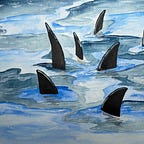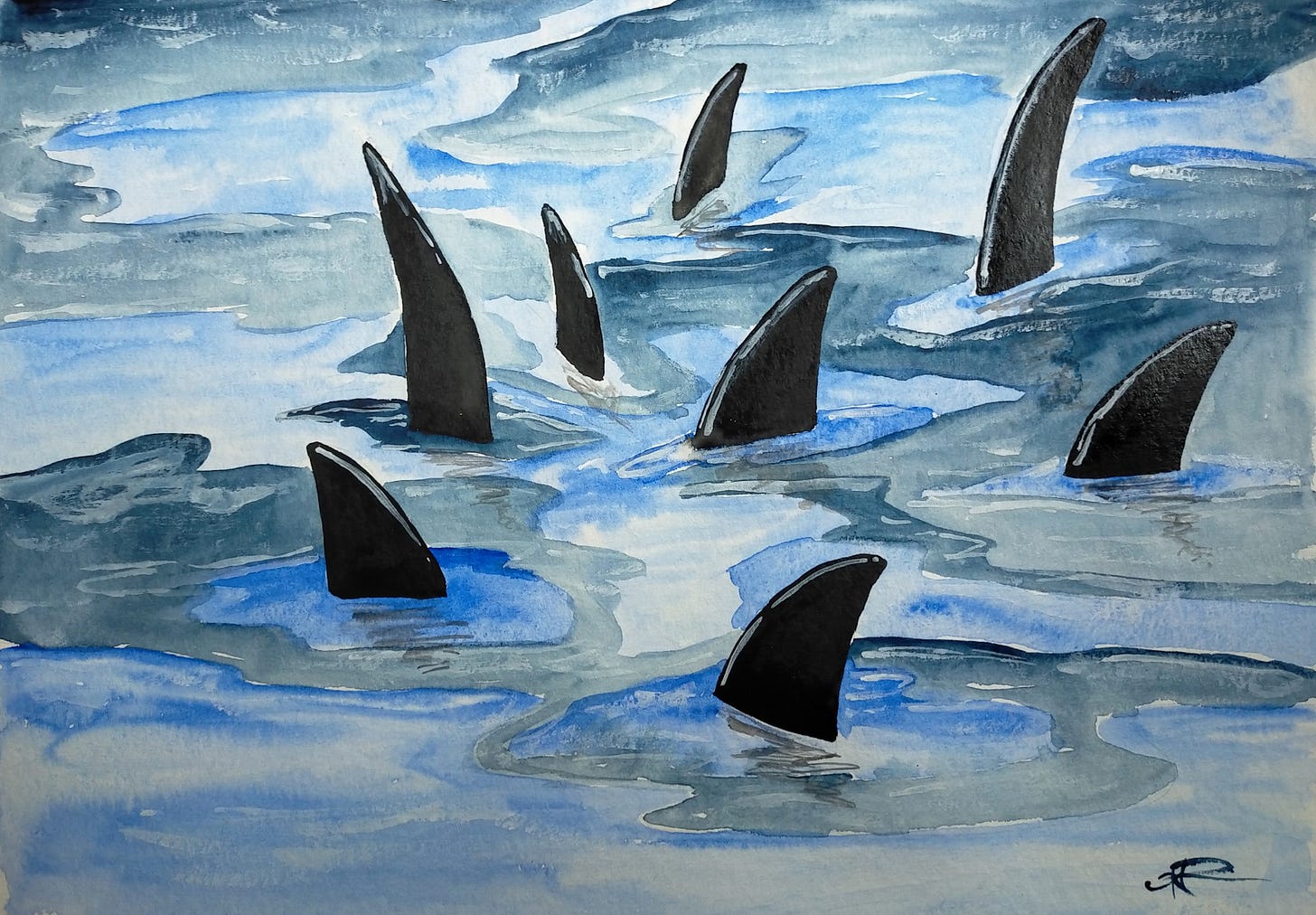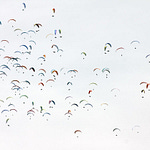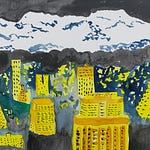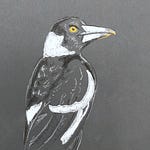Dear readers,
This month, something a little different, some autofiction from a time when I was in New Zealand about 10 years ago. It’s a little story that looks at a scenario in which I didn’t realise what was happening until after the fact, and it’s something that shows that in life we often don’t understand what is unfolding right before our eyes. Enjoy!
Regards,
Alia
It is noon on the grey coast of New Zealand’s Northland, a high tide of grey water under a grey sky and golden grey sand. Sticks, twisted black and broken, spear from beneath windblown bushes, stab the sand and cluster by the driftwood, bleached and beached. At the edges, barnacled black rocks stand steadfast in the waves, agitating the waters with their refusal to move, not an inch, not today, and not tomorrow. The breeze floats gently having failed to wake fully this day, sleepwalking through the grey-green grasses, over mounds and crabholes, mollycoddling the clouds and rippling the sea’s surface, which spills over the sand, popping bubbles, then shyly pulls away. There is an ant by the coastal brush.
The breeze sleepwalks over the knees and across the face of a woman lying on the sand, wisping strands of dark hair over her nose from ear to ear. She pulls the hair from her eyes and raises a book into the breeze, pages open, head planted in the sand staring up to a sky full of words. Rustling the pages, the breeze muzzles all else but the hush of the leaves and the sea; they are indistinguishable, punctuated on occasion by the caw of a gull. From down a sand-blown track that cuts through the thigh-deep green, a man and a woman come, stepping over sticks and on cockles, stepping over the ant, and walking a short way along the curvature of the bay, past the woman with the book to a decaying driftwood log on the edge of the dunes. They sit and pull sandwiches from a bag, ham and cheese and iceberg lettuce.
Staring out at the bay, they watch as eight long fins, shiny and black, rise from beneath the water. The fins rise tall in the grey water or the grey sky, one cannot tell, and slowly move in close to the beach, snug against the sand. They are so close they can almost touch the toes of the woman with the book. They huddle in the grey sky water that blankets all that lies beneath; bodiless fins, shiny and black reaching skyward and arching back like samurai swords that slice the scene. The woman stares up at her words and turns a page. It is a very good book.
Out on the boundary of the bay, between the headlands of barnacled black rocks, a single fin patrols back and forth, back and forth. The couple eating sandwiches watch it; they watch the huddling fins, bobbing up and down in the water like boats in the breeze. The fins are so peaceful that the woman with the sandwich says you could step barely two metres into the sea, water up to one’s hips, and just touch them, slip your hands over their blubbery bodies and down their backs, but she wouldn’t dare because she’s heard the old whaler tales from Eden and doesn’t trust orcas. She doesn’t trust humans either. She bites into her sandwich and hears the lettuce crunch between her teeth.
The fins are in a circle now, convening. The couple with the sandwiches watch, curious as to what they are doing on the shore. They watch the woman with the book and wonder if they should tell her she has orcas at her toes. She is staring up at her words and not at her toes as she turns another page of her very good book.
In the distance, the fin patrolling the bay has come closer but keeps well out. The fins on the beach drift and dip below the blanket of water, a little deeper now. From the east, a mother and daughter walk a small dog along the bay. They walk in the wake of the gentle grey wash and its foamy white spill, deep in conversation, and pass between the whales and the woman’s toes. The little dog bounces ahead. They don’t see the orcas. They are having a very important conversation.
How did they not see the orcas? thinks the woman with the sandwich. Perhaps they did. Perhaps they don’t care. Perhaps it’s a common sight. We are not from here, after all, she tells herself. Perhaps there is nothing remarkable about orcas on a beach in New Zealand, and she takes another bite of her sandwich while her eyes roam over the driftwood and around the bay toward the black barnacled rocks. Perhaps I am overwhelmed, and she recounts to her husband the time by the Saint Lawrence in Québec when they stopped the night at a hikers’ cabin in Forillon with its timber bunks and stove fireplace, and sat the evening out on the deck by the river. They had the world to themselves, a world of silver and shadow, of shimmering light, of silence, or so they thought, until they were started by the sound of a giant blowing its nose, a great propulsion, and there it was again, and along the shimmering river beneath them came a pod of minke whales skirting the riverbank with their flippers.
Perhaps it is a common sight.
Now, in their polar-fleece jackets, zipped to their chins, under mouths munching iceberg lettuce, devouring ham and bakery bread, they watch the mother and daughter with the small dog disappear along the beach. The woman with the book moves and they watch her too. She closes the very good book, stretches and rolls onto her hands and knees, her back to the salted sea, and dusting the sand, stands to leave. The fins dip deeper into the Davey deep.
Perhaps it’s not remarkable, the couple say as they finish their sandwiches and scatter the crumbs to the seagulls and sea snails, sea urchins and sailors. The samurai fin patrolling the bay has disappeared and the tips of the others are drifting in the grey day. Grains of sand blow over the couple’s shoes and into their shipwrecked socks as, standing to leave, they look to the sea once more and wonder if they saw anything at all. They walk back along the dunes to the sandy track, stepping over the sticks and on the cockles, and are gone.
The beach is deserted now save for the tips of fins barely discernible above the blanket. Beneath the surface, the orcas had come in close, huddling, nuzzling. They had moved gently, fawning over the newborn which, just a sandwich before, had quietly slipped tail first into the world and onto the sand of the sheltered bay. With their noses, the orcas had raised it up to draw from the surface its first breath, forming a circle of protection as it moved its flippers for the first time in the washing warm waters. Then, cradling their new life, their babe, their little love, they drifted gently, rocking into a world that is every bit grey and every bit remarkable, salt seasoned and shimmering. On the beach, the waves crashed into the barnacled black rocks and the breeze kicked sand along the shore. The ant was nowhere to be seen.
Thank you for Mind Flexing with me. If you enjoyed this essay, please subscribe on Substack or your favourite podcast app, comment, click the ❤️ button, or share it with someone who would appreciate it. I’ll be back in a month. Until then, keep 💪


